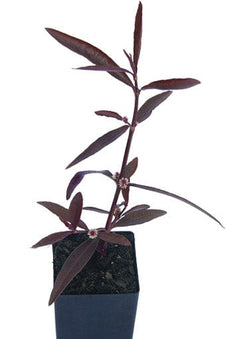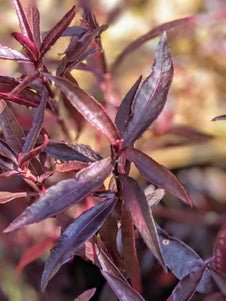





Purple Mukunu-Wenna
Purple Mukunu-Wenna
- In stock, ready to ship
- Inventory on the way

Usually available: All year
Life cycle: Perennial
Height: 40cm
Position: Sun / part shade
Soil preference: Moist / well drained
This is how we pack and send your Herb Plants to all states except TAS & WA
You will receive
- 1 Purple Mukunuwenna Herb Plant in a 50 X 75mm tube - General growing instructions
All of our Herb Plants are grown organically with certified organic potting mixes and fertilizers
Botanical Name: Alternanthera versicolor
Purple Mukuna-wenna is a mat-forming perennial that grows to about 40cm with a spread of 25cm. It could be considered a ground cover in many circumstances. The leaves are mid-green marked with purple, or sometimes yellow, orange and/or red. The leaves are elliptic to obovate, or essentially arrow-shaped and up to 2.5 cm long. The white flowers are insignificant and many people don’t notice them at all. They are less than 5mm in diameter, produced on an axillary spike 3-10cm and held in clusters near the leaves without stems. Flowering is variable throughout the year.
This plant comes from there Amaranth family and has high levels of anthocyanins, resulting in the purple colour leaves. The purple-leafed variety has the botanical name of Alternanthera versicolour, but the green variety is called Alternanthera sessilis, so you may see references to purple A. sessilis. Other names used for this plant include Sessile Joyweed, Red Carpet Weed, Red Sessile Joyweed, or Dwarf Copperleaf. It looks similar to alligator weed but is not the same plant.
The native environment includes India, Sri Lanka and other South-East Asian countries. The purple Mukunawenna plant has only recently been allowed into Australia as a result of restrictions being lifted. It has since become quite a common garden hedging plant, with mostly little known culinary and medical value.
Growing Conditions
Mukunawenna likes a variety of soil types and prefers them to be moist, but will grow anywhere from wetlands to normal soil conditions. It is not considered drought resistant but has a medium tolerance for wind and salinity. Partial shade is ideal but some sun is okay, especially if there is good water supply. Most conditions are handled without trouble and Mukunawenna is a fast grower.
This plant is sometimes sold as an aquarium plant. However it prefers soggy ground like pond surrounds, rather than to be completely submerged so it does not usually last very long. Propagation in the natural environment is by seeds that are wind or waterborne. The plant can also root at the stem nodes quite easily. This plant is very important due to its medicinal properties and research is being undertaken to develop in vitro growing techniques for commercial propagation.
Culinary Uses
South-East Asian recipes use the young shoots of the Mukunawenna plant as a vegetable and it is technically classified as a microgreen. The taste is considered to be somewhat bland, but the leaf is very rich in iron, vitamin A and dietary fibre. The rich nutrient levels have resulted in Mukunawenna being considered a valuable survival plant. Many people across the globe are seeking to add it to their own self-sufficient garden. It is usually mixed with other leafy green vegetables and the purple leaves add a striking contrast when used either cooked, raw or as a garnish.
Medicinal Uses
Alternanthera versicolor is a very useful plant that has a long history of traditional medicine use. It is used for a variety of seemingly unrelated conditions and ailments. The Mukunawenna plant is abundant in carotene and has traditionally been used as a remedy for night blindness and used generally for eye ailments. As well as using the juice of the plant for eye problems, the juice is used in hair treatments. It is also given to anaemic people in a soup, so they benefit from the high iron and protein content. Similarly, the leaves may be boiled in a tea. Other traditional uses include treating water retention, intestinal cramps, diarrhoea, dysentery, and externally as a cooling agent for fevers. Above all else, Mukunawenna is considered to be a good general tonic, valued for cooling the body, promoting energy and strengthening the nervous system and the eyes.
All information provided on this website is for informational purposes only. Please seek professional advice before commencing any treatment.





